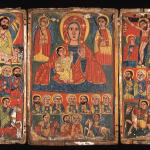Last updated on: January 9, 2015 at 7:00 pm
By
CNA Daily News
Erbil, Iraq, Jan 9, 2015 / 12:00 pm (CNA/EWTN News).- Archbishop Emil Nona is the Chaldean Archbishop of Mosul, the Iraqi city overrun by the Islamic State last summer. Since then, he has brought the voice of the Christians of Iraq to the West. "For us the faith is everything. It is our life, our identity, our history and our way of life. We can't separate ourselves from our faith in any way," Archbishop Nona told CNA. "Our faith, which has been in this land for more than 2,000 years, cannot come to an end so easily." He speaks with the clarity of someone who knows that without international help soon, more of the region will become territory of the Islamic State. Christians will have to abandon Iraq for good in order to save their lives and escape persecution and they will leave behind a land where Catholics have been present for more than 2,000 years. The Chaldean Archbishop of Mosul said, “Most Christians plan to leave Iraq because they thought the crisis would be short-lived and after we would return to our homes, but this has not been the case. There have been no positive signs in the last six months that our land will be liberated. The Islamic State is becoming increasingly stronger."No plans for liberation Although shortages are widespread in Iraq, thanks to Aid to the Church in Need shelter is being provided for more than 120,000 displaced Christians in northern Iraq. There temperatures in the winter drop to single digits, and so large tents have been set up so families can come together and stay warm. Space is limited but the people are grateful not to be exposed to the elements. In addition, help from Aid to the Church in Need made it possible for thousands of refugee children to receive a Christmas present, and plans are underway to set up schools so that children can continue studying until the situation becomes normal again. The shortages are widespread, but what this group of Christians lacks most isn't material things, but hope, as there are no signs things will improve. "They have lost faith in their land, where they have lived for thousands of years. They have lost faith in Muslim society because they helped loot our homes. Now they live in waiting, not knowing what is going to happen. The only thing they haven't lost is their Christian faith. We are proud because none of the 120,000 people in this area has converted to Islam," the archbishop explained. Faced with the choice of converting to Islam or death, the Christians of Mosul have preferred to die rather than deny the faith. In this desperate situation, Christians there do not complain or cry out to God for justice. "When something like this happens, we in the East thank God for everything. Because we know well that man is the cause of this problem, not God. In this situation, the existence of God is more necessary than ever, the presence of God is more powerful," Archbishop Nona said. "When there is such brutal violence on the part of man, the presence of God is even stronger, because He is good. We believe even more, because it is more necessary than ever to believe amidst a situation as extreme as this one.” The question of where is God in this persecution is a question "only you in the West pose. In the East we never ask that question. For us faith is enmeshed with our identity and the faith cannot be separated from our identity." These martyrs of the faith only ask that the rest of the world not forget about them, about their suffering, about the injustice they have endured each day for more than six months. For this reason, whenever they receive help it means much more than just a solution to the lack of shelter or food. "This aid is not only material but also shows that other Christians have not forgotten about us and experience the needs of Christians in Iraq as their own. We cannot ask them to stay in their land suffering if we do not help," Archbishop Nona said. "We can't know what will happen but up to now we have not seen any positive signs that our land and peoples will be liberated. Islamic militants are in the city of Mosul, on the Nineveh plain, in much of Iraq, but the Iraqi army does nothing to liberate these lands. We do not know the exact reason why we are not liberated and why there are only air raids. Up to now we haven't seen any region liberated, much less any plans for liberation," Archbishop Nona said.Radicalization in Iraq since 2003 Since the fall of the Hussein regime in 2003, the reconstruction of Iraq "has been based on errors,” he stated. “After 2003 Iraq was divided. The main problem confronting the country is not political but social, because before the fall of Saddam's regime nobody questioned whether you were Shiite, Christian or Muslim. Afterwards, each ethic group retreated to its origins and become closed in. And it will take dozens of years to resolve this situation." The radicalization of Islam has been progressive but fierce, and for this reason Archbishop Nona has said the suffering being experienced in Iraq "is the prelude to what Christians and Europeans in the West will suffer in the near future." Powerful and sobering words, but Archbishop Nona is not afraid to speak out. "The main problem is not fundamental Islamic groups but Islamic societies. Day by day Muslims are becoming more radical, traditional and closing themselves off,” he said. "Muslims think that their way of defending the faith is going back to how things were before. There is a conflict in the Islamic region between modernity and faith. Most think that righteous faith is against modernity and therefore wherever there are Muslims the danger that they will rebel against modernity exists." Archbishop Nona pointed to the case of the agents from Saddam Hussein's secret service who are now part of the inner circle of the Islamic State caliph, Abu Bakr al-Baghdadi. "They were all laymen, they did not profess any faith when they worked for Hussein. But they radicalized later because they were afraid of fundamentalist groups." For this reason, he warned, "Muslims who are in the West can one day become fundamentalists. Among the ranks of the Islamic State fighters in Iraq are people from Europe, Canada and America. When the Islamic State wants to carry out a suicide attack, the suicide bombers are from Germany, England, France; they are not from Muslim countries, but instead were born in Europe. They were educated in the West and later came to Iraq." Read more















